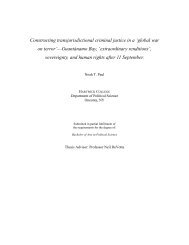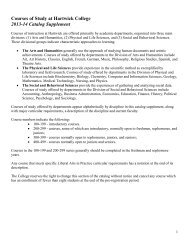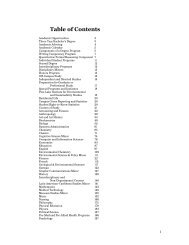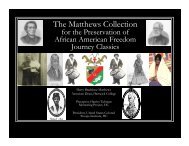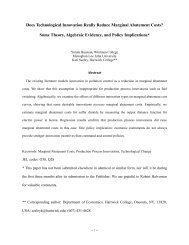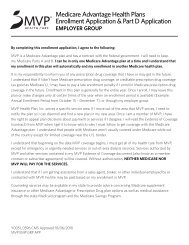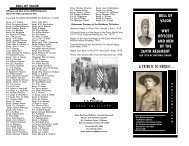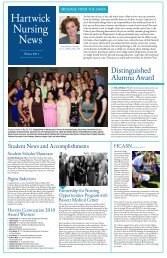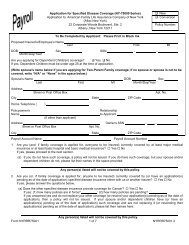Table of Contents - Hartwick College
Table of Contents - Hartwick College
Table of Contents - Hartwick College
Create successful ePaper yourself
Turn your PDF publications into a flip-book with our unique Google optimized e-Paper software.
on public policy regarding children at local, national, and global levels. It<br />
also is a goal <strong>of</strong> this course to raise consciousness about the state <strong>of</strong> the<br />
world’s children and to empower us to work effectively, cooperatively,<br />
and justly with one another and with children and organizations in our<br />
communities. Topics include structural violence including war and kids’<br />
lives; poverty, race, class, and children; global inequities; social<br />
construction <strong>of</strong> gender; child labor; poverty in the U.S. and Global South;<br />
children’s human rights; justice, equity, and public policy. Substantial<br />
community action/community-based learning component. (SBA)<br />
205 Deviance and Social Control (3 credits) Why deviant and deviant<br />
from what?; by whose standards? Various forms <strong>of</strong> behavior such as<br />
suicide, alcoholism, homosexuality, mental illness and drug abuse are<br />
studied within the context <strong>of</strong> American society. Considerable emphasis is placed<br />
on social theory that helps to explain the behavior and how it comes to be defined<br />
as deviant. This course also examines the social responses to the behavior and<br />
the means <strong>of</strong> social control exerted by the society. Prerequisite: another<br />
sociology course. (SBA)<br />
208 Gender and Sexuality (3 credits) Every society constructs gender<br />
roles and identities, values and norms to regulate the beliefs, feelings and<br />
sexual behaviors <strong>of</strong> its members. This course seeks to explore many<br />
dimensions <strong>of</strong> sex and sexuality within American society by providing a<br />
wide variety <strong>of</strong> approaches to understanding the physical being and its<br />
functioning within the sexual realm. Small group discussion, guest expert<br />
lecturers and panelists, films, role-playing, readings, projects, and field<br />
trips are all employed in producing the variety <strong>of</strong> approaches. (SBA)<br />
211 Teens and Families (4 credits) Diversity <strong>of</strong> families, trends in family<br />
change, youth and communities, adolescent identity. Substantial communitybased<br />
work with teens is required. (SBA)<br />
225 Human Rights (3 credits) This course will focus on the dramatic post<br />
cold-war transformation <strong>of</strong> human rights as a focus <strong>of</strong> social struggle and<br />
will examine the contradictions between the Human Rights standards the<br />
U.S. demands <strong>of</strong> other countries and its own practices at home and abroad.<br />
Prerequisite: another course in sociology. (NTW) (SBA)<br />
230 Poverty and Affluence in American Society (3 credits) An analysis<br />
<strong>of</strong> the distribution <strong>of</strong> wealth, income and power historically and<br />
contemporaneously in American society with emphasis placed upon the<br />
working conditions, living conditions, aspirations, family styles,<br />
organizing capacities and political power <strong>of</strong> various groups ranging from<br />
the poorest to the most affluent. (SBA)<br />
240 Women and Social Change (4 credits) This course investigates how<br />
societies structure gender and how race, class, and gender intersect. It<br />
analyzes gender from interpersonal, interactional, institutional, historical,<br />
and cross-cultural points <strong>of</strong> view. The goal <strong>of</strong> the course is to formulate a<br />
theoretical and practical understanding <strong>of</strong> gender and gender inequality as<br />
it exists today and to develop strategies to create more egalitarian systems.<br />
Community organizing/group work component. Specific topics include:<br />
feminist theory, women <strong>of</strong> color, political struggles, reproductive justice,<br />
economic justice, body politics. Substantial community-based work is required<br />
Prerequisite: another sociology course. (SBA)<br />
250 Topics in Sociology (3 or 4 credits) See description for SOC 150.<br />
Examples <strong>of</strong> recent 250 topics courses include, criminal justice, social<br />
226



